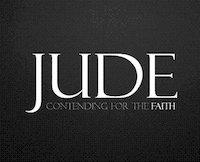Called
18 April 2014
“Jude, the servant of Jesus Christ, and brother of James, to them that are sanctified by God the Father, and preserved in Jesus Christ, and called: mercy unto you, and peace, and love, be multiplied.” (Jude 1,2)

The last descriptive term Jude gives his audience is "called." By putting the term called last in his list has given us an excellent, succinct statement of the doctrine of salvation. Many would teach that it is man’s decision to follow Christ that is the crucial point of personal salvation. Jude, as well as all other authors of Scripture, teaches that the work in salvation is done by God, not man. In fact, Jude even points out that the children of God are eternally secure even before they are called!
This means that even before a person is born again, God sees them as completely saved. Paul, in the Roman letter, explains God’s perspective of salvation by placing all the key elements in the past tense.
“And we know that all things work together for good to them that love God, to them who are the called according to his purpose. For whom he did foreknow, he also did predestinate to be conformed to the image of his Son, that he might be the firstborn among many brethren. Moreover whom he did predestinate, them he also called: and whom he called, them he also justified: and whom he justified, them he also glorified.” (Romans 8:28-30)
Further, consider these words of eternal comfort found in Jeremiah;
“The Lord hath appeared of old unto me, saying, Yea, I have loved thee with an everlasting love: therefore with lovingkindness have I drawn thee.” (Jeremiah 31:3)
God’s love existed before the new birth and that eternal, electing love is the very reason the elect are born again. God’s love for His children is the cause of all salvation not the effect of man’s choice, will, act, or decision.
“Herein is love, not that we loved God, but that he loved us, and sent his Son to be the propitiation for our sins.” (1st John 4:10)
Therefore, the intended audience in the first century, and now, are those who have been born of the Spirit of God and are already eternally secure in the love of God. This is important to understand because Jude is about to give some pretty harsh examples of God’s judgment against wickedness and sin. However, he encapsulates these warnings with statements of sovereign grace and eternal security for his elect readers. He opens, as we have just seen, with a clear message of their security. And he closes the epistle with the same comfort.
“Now unto him that is able to keep you from falling, and to present you faultless before the presence of his glory with exceeding joy, to the only wise God our Saviour, be glory and majesty, dominion and power, both now and ever. Amen.” (Jude 24,25)

